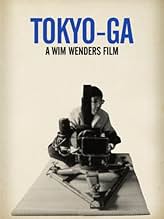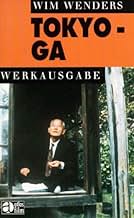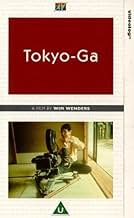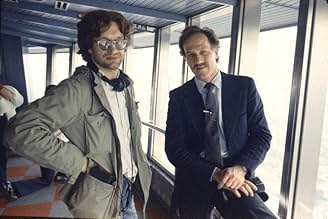IMDb-BEWERTUNG
7,3/10
3894
IHRE BEWERTUNG
Bewegt durch das Werk des Regisseurs Yasujirô Ozu, reist Wim Wenders nach Japan auf der Suche nach dem Tokio, das in Ozus Filmen zu sehen ist.Bewegt durch das Werk des Regisseurs Yasujirô Ozu, reist Wim Wenders nach Japan auf der Suche nach dem Tokio, das in Ozus Filmen zu sehen ist.Bewegt durch das Werk des Regisseurs Yasujirô Ozu, reist Wim Wenders nach Japan auf der Suche nach dem Tokio, das in Ozus Filmen zu sehen ist.
Empfohlene Bewertungen
I love Wim Wenders and most of his films that I have seen. I love and venerate the films of the Japanese master Yasujirô Ozu. 'Tokyo-Ga', the documentary realized in 1985 by Wenders researching the echoes of the works of the great Japanese director 20 years after his death, trying to find what was left of the landscape, characters and spirit of his movies, was of great promise to me. I confess however that one plus one in this case did not make more than two or even equal two. The film, which I have seen in a retrospective of Wenders' earlier movies that started at the local cinematheque slightly disappointed me.
'Tokyo-Ga' is conceived as a travel journal with a definite goal. Wenders tells it in the opening, actually we will hear his voice for the whole duration of the film, even relaying and translating to German what the persons he interviews have to say. He flies to Japan to find what is left of the landscape of Tokyo that inspired the films of Ozu. On the plane he sees a movie and makes an ironic remark about commercial Hollywood movies, while we have a glimpse from ''On Golden Pond' actually not a bad film at all. The film seems to be a chronological journal of his first encounter with Japan. He meets with people who worked with Ozu and interviews them. He films almost everything he encounters - the metropolitan jungle of Tokyo in the 1980s (still looking futuristic even today), kids playing baseball in a cemetery, trains, many trains, Japanese men fascinated with electronic games, young people dancing rock in a park, a factory were the plastic models that represent dishes in Japanese restaurants are created. He meets fellow film makers and discusses cinema and the Japanese landscape with them. Some of the scenes are related vaguely with Ozu's films (the games, the trains). Some other seem completely unrelated. Wenders had come too late in his search. The spirit of Ozu is no longer there, not in the landscape in any case. It's another city, another country, another world. The process of change, of americanization, of fading out of the Japanese culture described by Ozu in his post-war movies had been completed.
I mostly liked the two interviews in the film - with one of his prefered actors and with the camera man. They brought back the personality of the great film maker, and also defined very well the relationship between the film director and his collaborators. The two were keeping for him the respect due to a father and master of his profession. At the same time we get from both the image of a creator who planned every detail of his films rigurously, who knew exactly why and how the film will be made, who had reached the genial simplicity of his expression by rigurous thinking and permanent cizeling of his artistic tools. Wenders' movie 'Tokyo-Ga' is very different, it's almost spontaneous filming as things happen. We can feel the deep respect of Wenders for Ozu, but in order to understand the art of the Japanese master there is no alternative but seeing his films.
'Tokyo-Ga' is conceived as a travel journal with a definite goal. Wenders tells it in the opening, actually we will hear his voice for the whole duration of the film, even relaying and translating to German what the persons he interviews have to say. He flies to Japan to find what is left of the landscape of Tokyo that inspired the films of Ozu. On the plane he sees a movie and makes an ironic remark about commercial Hollywood movies, while we have a glimpse from ''On Golden Pond' actually not a bad film at all. The film seems to be a chronological journal of his first encounter with Japan. He meets with people who worked with Ozu and interviews them. He films almost everything he encounters - the metropolitan jungle of Tokyo in the 1980s (still looking futuristic even today), kids playing baseball in a cemetery, trains, many trains, Japanese men fascinated with electronic games, young people dancing rock in a park, a factory were the plastic models that represent dishes in Japanese restaurants are created. He meets fellow film makers and discusses cinema and the Japanese landscape with them. Some of the scenes are related vaguely with Ozu's films (the games, the trains). Some other seem completely unrelated. Wenders had come too late in his search. The spirit of Ozu is no longer there, not in the landscape in any case. It's another city, another country, another world. The process of change, of americanization, of fading out of the Japanese culture described by Ozu in his post-war movies had been completed.
I mostly liked the two interviews in the film - with one of his prefered actors and with the camera man. They brought back the personality of the great film maker, and also defined very well the relationship between the film director and his collaborators. The two were keeping for him the respect due to a father and master of his profession. At the same time we get from both the image of a creator who planned every detail of his films rigurously, who knew exactly why and how the film will be made, who had reached the genial simplicity of his expression by rigurous thinking and permanent cizeling of his artistic tools. Wenders' movie 'Tokyo-Ga' is very different, it's almost spontaneous filming as things happen. We can feel the deep respect of Wenders for Ozu, but in order to understand the art of the Japanese master there is no alternative but seeing his films.
This had been on my watchlist for ages, but after watching the excellent Perfect Days, it became a top priority. Both have Wim Wenders exploring Japan, though Tokyo-Ga is a documentary, and one with a surprising focus on Yasujiro Ozu. When Wenders is focused on Ozu, and interviewing people who knew the legendary filmmaker, I think Tokyo-Ga is at its best.
There are other sections dedicated to just exploring technology and life in Japan, but these parts come up a little short at times. Wenders' narration can feel a little surface-level at times, or at least not as exceptional as Werner Herzog's would be, if he handled a film like this (he does have a cameo appearance here though, which was cool).
It's a pretty good watch. It doesn't do for the documentary genre what Perfect Days does for non-documentary films, by any means, but it's still fairly good for what it is, and was relatively interesting to me throughout.
There are other sections dedicated to just exploring technology and life in Japan, but these parts come up a little short at times. Wenders' narration can feel a little surface-level at times, or at least not as exceptional as Werner Herzog's would be, if he handled a film like this (he does have a cameo appearance here though, which was cool).
It's a pretty good watch. It doesn't do for the documentary genre what Perfect Days does for non-documentary films, by any means, but it's still fairly good for what it is, and was relatively interesting to me throughout.
Wim Wenders attempts to turn his first trip to Japan into a homage to Ozu and an exploration of Japanese modernity, contrasted with the images of a bygone era glimpsed in Tokyo Monogatari.
This is a deeply personal film, an unabashed pilgrimage by Wenders in search of his muse. His rambling narration, impenetrable at times, offers little insight on Japan. What first-time visitor can encapsulate a city as complex as Tokyo? The film works better on the subject of Ozu, the interviews with actor Chishu Ryu and cinematographer Yuuharu Atsuta offering glimpses of Ozu the man behind the icon. They also reveal the affecting power of cinema, both men clearly humbled and moved by the experience of collaborating with Ozu. The bottom line, however, is that this is a film about Wim Wenders, about his nascent stage as a filmmaker and how that came to fruition in the way it did. Fans of Wenders, rather than Ozu or Japanophiles, are the audience for this film.
Technically the film offers up a few gifts, the prime example being a glimpse of the craftsmanship that goes into the making of the ubiquitous wax food in restaurant display windows. Unlike the weekend rockabilly dancers, crowded commuter trains, or oppressive concrete and steel structures, this sequence brings something both long-term residents and those ignorant of Japan will find fresh and illuminating. Unfortunately, elsewhere the film is interspersed with interminable footage of being in a taxi, being in a train, men hitting golf balls... all protracted shots for no other reason than to add a touch of Ozu to the film. A funky, slightly disturbing score helps make these sequences bearable.
Tokyo-Ga is recommended for Wenders fans, and perhaps as nostalgia for anyone who spent a brief time in Japan in the mid-Eighties.
This is a deeply personal film, an unabashed pilgrimage by Wenders in search of his muse. His rambling narration, impenetrable at times, offers little insight on Japan. What first-time visitor can encapsulate a city as complex as Tokyo? The film works better on the subject of Ozu, the interviews with actor Chishu Ryu and cinematographer Yuuharu Atsuta offering glimpses of Ozu the man behind the icon. They also reveal the affecting power of cinema, both men clearly humbled and moved by the experience of collaborating with Ozu. The bottom line, however, is that this is a film about Wim Wenders, about his nascent stage as a filmmaker and how that came to fruition in the way it did. Fans of Wenders, rather than Ozu or Japanophiles, are the audience for this film.
Technically the film offers up a few gifts, the prime example being a glimpse of the craftsmanship that goes into the making of the ubiquitous wax food in restaurant display windows. Unlike the weekend rockabilly dancers, crowded commuter trains, or oppressive concrete and steel structures, this sequence brings something both long-term residents and those ignorant of Japan will find fresh and illuminating. Unfortunately, elsewhere the film is interspersed with interminable footage of being in a taxi, being in a train, men hitting golf balls... all protracted shots for no other reason than to add a touch of Ozu to the film. A funky, slightly disturbing score helps make these sequences bearable.
Tokyo-Ga is recommended for Wenders fans, and perhaps as nostalgia for anyone who spent a brief time in Japan in the mid-Eighties.
the footage is lush and gorgeous, German camera-work of the 70s-80s of the highest caliber. but...the content I found ... appalling! it's been 15 or so years since I saw it and haven't thought about it in a long time, but was just reminded while suffering through this documentary about a feature film called "Jew Süss" ... but my impression of the overall tone is ineradicable . . . I have to admit I'd entirely forgotten the "Ozu love letter" element of the whole thing.
more enjoyable is a documentary about designer Yojhi Yamamoto that I saw at about the same time in this big Wim Wenders retrospective. another film that was a very sweet standout was "A Trick of the Light" about film pioneers whose work was eclipsed by developments of Lumiere in France starring Udo Kier, which I recommend highly.
Wim Wenders...is kind of a shallow filmmaker in my estimation. As with Tokyo Ga I'm sure he had no idea what a potentially offensive film he made. I remember particularly a sequence about some sort of Japanese pinball game that is insanely popular there, his reflections upon which seemed the fruit of a (lack of) intelligence of the sort that characterizes also that cinema excreta "Lost in Translation". the deep meaning of which seems to be "god what a bunch of freaks these Japs are for not speaking English and not modeling themselves after the oh so kewl savvy ironic US population what in god's name is wrong with them?!
more enjoyable is a documentary about designer Yojhi Yamamoto that I saw at about the same time in this big Wim Wenders retrospective. another film that was a very sweet standout was "A Trick of the Light" about film pioneers whose work was eclipsed by developments of Lumiere in France starring Udo Kier, which I recommend highly.
Wim Wenders...is kind of a shallow filmmaker in my estimation. As with Tokyo Ga I'm sure he had no idea what a potentially offensive film he made. I remember particularly a sequence about some sort of Japanese pinball game that is insanely popular there, his reflections upon which seemed the fruit of a (lack of) intelligence of the sort that characterizes also that cinema excreta "Lost in Translation". the deep meaning of which seems to be "god what a bunch of freaks these Japs are for not speaking English and not modeling themselves after the oh so kewl savvy ironic US population what in god's name is wrong with them?!
Wim Wenders' praising, honest, confessional, hurriedly made and rather superficial love letter to the great Japanese filmmaker (and essential influence on WW's work) Yasujiro Ozu. This documentary intermingles some footage of Ozu's Tokyo Monogatari (in a bad copy, which is really a disservice to Ozu's art!); highly reverent interviews with Ozu's signature actor Chishu Ryu and longtime cameraman Yuharu Atsuta, both in their eighties but remarkably keen; and Wenders' own discovery (it's his first time there) of a high-tech, overcrowded, Americanized Tokyo, radically different from WW's preconceived image of an almost provincial post-war Tokyo that he had idealized through Ozu's films.
There are beautiful images by great cameraman Ed Lachman, especially the night shots; but overall it's pretty much familiar territory: trains (old trains, new trains, bullet trains), the overcrowded subway, the concrete jungle, the neon signs, the "copycat" fetishism (fake food, fake golf, fake rock'n'roll), baseball games, the video game mania, Japanese politeness, Japanese formality, Japanese impenetrability. It's a traveling journal, narrated by WW himself, where insightful and obvious remarks come in turns. It's a film with too few highlights (Atsuta's interview, Werner Herzog's maniac speech about his search for "clean, pure images"), and inevitably superficial: like all big towns, Tokyo can't be covered and deciphered by a first-timer; and like all great artists, Ozu's unique universe can't be grasped by a couple of interviews, anecdotes or images. When WW talks about Ozu's art, he's of course telling us about himself and his own cinema.
There's a telling sequence, where WW gets to meet French filmmaker Chris Marker in a Tokyo night-bar called "La Jetée" (the title of Marker's landmark 1962 science-fiction/photo-poem short). Marker - who spent considerable time in Japan over the years -- put Tokyo and Japanese culture at the center of one of the most brilliant personal essays/ journals ever filmed, the incomparable "Sans Soleil" (1982). At one point, WW mentions that "Sans Soleil" is filled with "images of Japan not allowed to foreigners like me". Hence my suggestion: if you want to know more about Ozu, watch his films; if you want to see a revealing, knowledgeable essay by a Westerner on Japan, pass on "Tokyo-Ga" and try "Sans Soleil" instead; if you want a deeply insightful look into WW's work, read the great essay on WW "Eyes Can't Be Bought" by Peter Buchka.
There are beautiful images by great cameraman Ed Lachman, especially the night shots; but overall it's pretty much familiar territory: trains (old trains, new trains, bullet trains), the overcrowded subway, the concrete jungle, the neon signs, the "copycat" fetishism (fake food, fake golf, fake rock'n'roll), baseball games, the video game mania, Japanese politeness, Japanese formality, Japanese impenetrability. It's a traveling journal, narrated by WW himself, where insightful and obvious remarks come in turns. It's a film with too few highlights (Atsuta's interview, Werner Herzog's maniac speech about his search for "clean, pure images"), and inevitably superficial: like all big towns, Tokyo can't be covered and deciphered by a first-timer; and like all great artists, Ozu's unique universe can't be grasped by a couple of interviews, anecdotes or images. When WW talks about Ozu's art, he's of course telling us about himself and his own cinema.
There's a telling sequence, where WW gets to meet French filmmaker Chris Marker in a Tokyo night-bar called "La Jetée" (the title of Marker's landmark 1962 science-fiction/photo-poem short). Marker - who spent considerable time in Japan over the years -- put Tokyo and Japanese culture at the center of one of the most brilliant personal essays/ journals ever filmed, the incomparable "Sans Soleil" (1982). At one point, WW mentions that "Sans Soleil" is filled with "images of Japan not allowed to foreigners like me". Hence my suggestion: if you want to know more about Ozu, watch his films; if you want to see a revealing, knowledgeable essay by a Westerner on Japan, pass on "Tokyo-Ga" and try "Sans Soleil" instead; if you want a deeply insightful look into WW's work, read the great essay on WW "Eyes Can't Be Bought" by Peter Buchka.
Wusstest du schon
- Zitate
Wim Wenders: It felt good just to look out the window. If only it were possible to film like that, I thought to myself, like when you open your eyes sometimes just to look without wanting to prove anything.
- VerbindungenFeatured in Das Meer das denkt (2000)
Top-Auswahl
Melde dich zum Bewerten an und greife auf die Watchlist für personalisierte Empfehlungen zu.
- How long is Tokyo-Ga?Powered by Alexa
Details
- Erscheinungsdatum
- Herkunftsländer
- Sprachen
- Auch bekannt als
- Tokyo Ga
- Drehorte
- Produktionsfirmen
- Weitere beteiligte Unternehmen bei IMDbPro anzeigen
Zu dieser Seite beitragen
Bearbeitung vorschlagen oder fehlenden Inhalt hinzufügen












